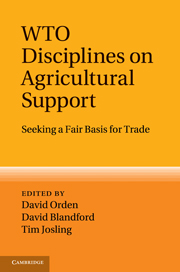Book contents
- Frontmatter
- Contents
- List of figures
- List of tables
- Notes on contributors
- Preface
- List of acronyms
- PART I overview of domestic support issues and WTO rules
- PART II Developed countries: have high levels of support come down?
- 3 European Union
- 4 United States
- 5 Japan
- 6 Norway
- PART III Developing countries: will low levels of support rise?
- PART IV Looking forward: can fair markets be achieved?
- Appendix A Domestic support provisions of the Agreement on Agriculture
- Appendix B Domestic support provisions of the Doha draft modalities
- Index
- References
3 - European Union
Published online by Cambridge University Press: 11 April 2011
- Frontmatter
- Contents
- List of figures
- List of tables
- Notes on contributors
- Preface
- List of acronyms
- PART I overview of domestic support issues and WTO rules
- PART II Developed countries: have high levels of support come down?
- 3 European Union
- 4 United States
- 5 Japan
- 6 Norway
- PART III Developing countries: will low levels of support rise?
- PART IV Looking forward: can fair markets be achieved?
- Appendix A Domestic support provisions of the Agreement on Agriculture
- Appendix B Domestic support provisions of the Doha draft modalities
- Index
- References
Summary
Notifications of the level of domestic support by the EU to the WTO since 1995 reflect a substantial shift in the nature of domestic farm policy over that period. These policy changes have reduced the amount of support given by instruments that are most likely to distort trade. Though domestic support notifications are only one component of a full evaluation of the impact of policy changes on trade patterns, they are intended to indicate the extent to which such changes have moved countries along the path toward policies that have less impact on other countries. They monitor compliance with rules and commitments that were introduced to provide disciplines for certain types of domestic policies that were deemed to be particularly disruptive of trade. Other parallel disciplines that apply to tariffs (elimination of non-tariff barriers and binding tariff levels) and export subsidies (binding and reducing both expenditures and quantities of exports benefiting) have also impacted the levels of support and protection of EU agriculture.
The EU has in recent years expanded its membership to twenty-seven countries, in the process changing the nature of the agricultural sector. It has substantially reformed its Common Agricultural Policy (CAP), moving from price support for the major commodities to a comprehensive system of payments to farmers that are less related to present production. In addition, the EU has been the respondent in several challenges in the WTO that involve agricultural products.
- Type
- Chapter
- Information
- WTO Disciplines on Agricultural SupportSeeking a Fair Basis for Trade, pp. 61 - 96Publisher: Cambridge University PressPrint publication year: 2011
References
- 3
- Cited by



